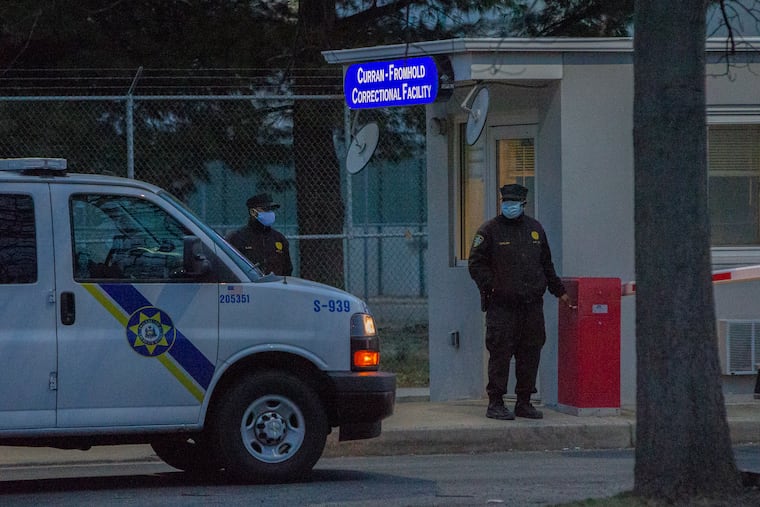Philly’s shockingly inhumane prison conditions | Opinion
It is up to Mayor Kenney to take steps to solve this crisis before anyone else is harmed.

The last year has been hard for everyone, but for inmates and correctional officers at Philadelphia prisons, and their families, the last year has been unbearable.
The conditions inside these facilities are inhumane. Inmates awaiting trial, or probation or parole hearings — many of whom are young Black people, often men — spend extended periods of time, sometimes 22 or 23 hours a day locked in their cells. They have no in-person visits and limited access to phone or video calls. They are experiencing delays in medical care and counseling services and have limited access to showers.
These conditions have led to an increase in violence. Since August 2020, there have been five inmate-on-inmate homicides in the prisons, more than the previous eight years combined. Inmate-on-inmate violence is a clear indicator of an unsafe environment and a lack of protection for those individuals in the care of our prison system.
I visited prison facilities twice over the summer, in June and again in August. While there, I spoke to correctional officers — including lieutenants, captains, and veterans who’ve worked there for more than 20 years – who said conditions are the worst they have ever seen. They told me that they often could not let inmates out of their cells because there were not enough staff on duty. I spoke to one correctional officer who teared up talking about the increased number of attacks on guards and how afraid she is for her safety when she is alone on shifts. I entered housing units where people screamed for help from their cells, begging to see their families.
These visits were shocking. I have visited our prison facilities in the past and have not seen anything like this.
Philadelphia has passed the tipping point.
Prison staffing is a crisis — a crisis with long-lasting impacts on the communities most likely to be involved with the criminal justice system. About six months ago, my office began receiving complaints about the conditions at Philadelphia’s prison facilities. I charged my office with looking into the complaints from an operational standpoint and quickly realized how dire the situation was. In June, my office released an analysis of the Department of Prisons, showing the department was operating 382 officers below the approved level for officer and inmate safety. The city made considerable progress reducing the prison population between 2015 and 2019, but the population has only decreased by about 2% since 2019. Prison staffing levels, meanwhile, have dropped by 28% over the same time.
The administration responded to the report, as well as calls from other elected officials and the Pennsylvania Prison Society, by saying it was doing everything it could, and new classes would be graduating over the next few months.
Yet, despite the administration’s promises, the problem has only gotten worse. Correctional officers, sergeants, lieutenants, captains, and even wardens continue to resign as conditions deteriorate further. As of Sept. 23, prison staffing remained 500 officers below where it needs to be to operate safely.
» READ MORE: ‘We need help’: Video, reports depict violence and ‘riots’ at Philadelphia jails
The one silver lining is that it’s a crisis about which we can do something.
Mayor Kenney has stated several times that prison staffing is a problem across the nation. If it is a problem in other places, it means other places are working on solutions and we need only to look at those other counties and states for potential ideas.
When prisons in several states were experiencing high rates of employee leave at the height of the pandemic, governors from Ohio, Indiana, New Hampshire, Montana, South Carolina, and others activated the National Guard to serve as temporary staffing support in state and county facilities. Nebraska attempted to attract applicants with hiring bonuses, while Idaho tried retention bonuses for correctional officers after a specified term of service. And still others have tried to speed up the process for getting correctional officers on the job by streamlining the hiring and testing process.
None of these ideas are perfect or without drawbacks. But trying to do something is better than doing nothing and leaving officers to work in an unsafe environment and inmates to live in inhumane conditions — which is what is happening in Philadelphia.
The current state of Philadelphia’s prisons has created an environment where inmates are traumatized and disconnected from the relationships with people who will help them survive their time and support them when they try to transition to life outside of prison.
» READ MORE: Public defender says Philly jails are ‘cruel and callous,’ and violate clients’ rights
Our prisons need more correctional officers. But this isn’t just a staffing or administrative issue. When most individuals who are incarcerated are people of color and suffering this kind of mistreatment, it is an issue of racial justice.
The condition of Philadelphia’s prisons is unsustainable, dangerous, and unacceptable. It is up to Mayor Kenney to take steps to solve this crisis before anyone else is harmed.
Rebecca Rhynhart is Philadelphia’s city controller.